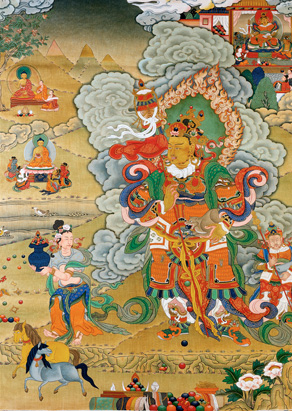Vaishravana: Difference between revisions
RyanConlon (talk | contribs) No edit summary |
mNo edit summary |
||
| Line 1: | Line 1: | ||
[[Image:VaisravanaTST.jpg|frame|Vaishravana]] | [[Image:VaisravanaTST.jpg|frame|Vaishravana]] | ||
'''Vaishravana''' (Skt. ''Vaiśravaṇa''; Tib. [[རྣམ་ཐོས་སྲས་]], ''Namtösé'' | '''Vaishravana''' (Skt. ''Vaiśravaṇa''; Tib. [[རྣམ་ཐོས་སྲས་]], ''Namtösé'', [[Wyl.]] ''rnam thos sras''; Eng. 'Son of Viśravas') — one of the [[Four Great Kings]], also known as '''Kubera'''. He is Guardian King of the '''North''', in a realm called Adakavati (Tib. [[ལྕང་ལོ་ཅན]], ''Canglocan'', [[Wyl.]] ''lcang lo can''), and leader of the [[yaksha]]s (who are also called guhyakas). | ||
Wearing golden armour, Vaishravana protected the [[gods]] from the [[asura]]s ([[demi-gods]]). | Wearing golden armour, Vaishravana protected the [[gods]] from the [[asura]]s ([[demi-gods]]). | ||
Revision as of 20:11, 19 January 2020

Vaishravana (Skt. Vaiśravaṇa; Tib. རྣམ་ཐོས་སྲས་, Namtösé, Wyl. rnam thos sras; Eng. 'Son of Viśravas') — one of the Four Great Kings, also known as Kubera. He is Guardian King of the North, in a realm called Adakavati (Tib. ལྕང་ལོ་ཅན, Canglocan, Wyl. lcang lo can), and leader of the yakshas (who are also called guhyakas).
Wearing golden armour, Vaishravana protected the gods from the asuras (demi-gods).
Vaishravana now occupies the highest position among the Four Guardian Kings and specifically protects Shakyamuni’s Vinaya teachings, protecting those who practise shila (self-discipline).
Because his breath is harmful he keeps his mouth tightly closed. He confers spiritual and material wealth on practitioners of the Dharma, symbolized by the jewel-producing mongoose in his left hand.
Further Reading
- Crystal Mirror, volume VI, Dharma Publishing 1984